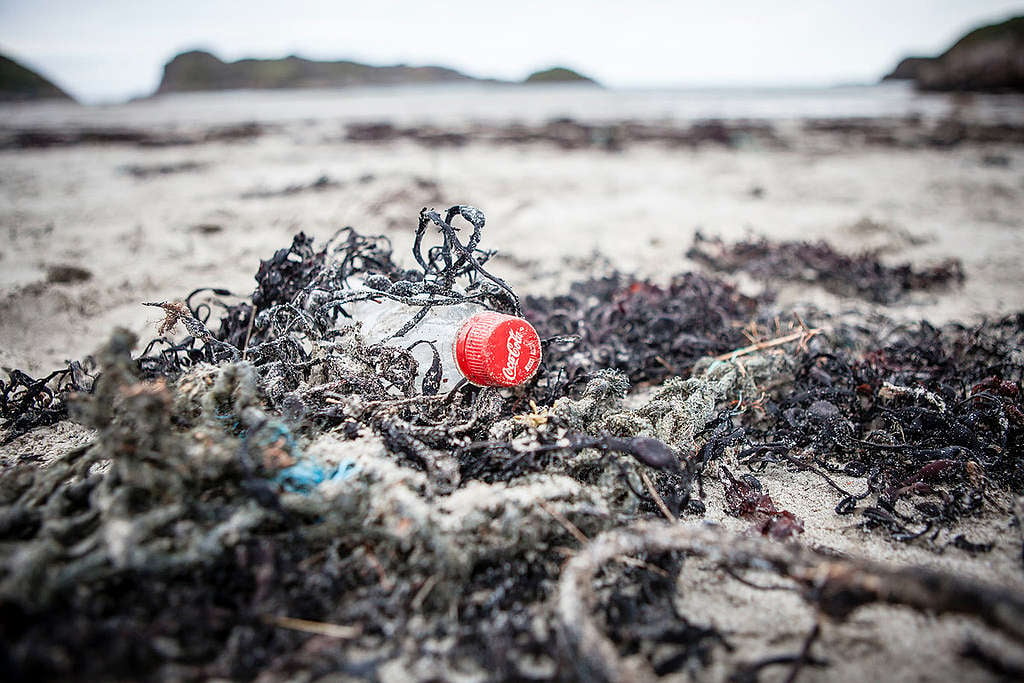Coke is one of the most recognizable brands in the world and says it is committed to environmental sustainability. As the world’s largest soft drink company, Coca-Cola has a special responsibility to drastically reduce its plastic footprint and stop its bottles from choking our oceans.

Maybe you’ve seen our video remake of Coke’s classic holiday commercial and you’re wondering why we decided to single out the company. It’s a good question. Plastic pollution is a massive problem worldwide. The equivalent of one garbage truck of plastic enters our seas every minute, every day, all year long. Plastics are filling up our landfills, choking our rivers, contaminating our oceans, harming marine life, breaking down into microplastics, and entering the food chain—even ending up in the seafood on our plates and in our tap water. But surely this is everyone’s problem, so why are we focusing on Coke now?
- Plastic bottles and caps are consistently one of the largest sources of ocean plastic pollution found in global beach cleanups.
- One million plastic bottles are sold around the world every minute.
- More than half of the 500 billion plastic bottles manufactured each year are thrown away after a single use.
- Coca-Cola produces over 110 billion of these single-use plastic bottles each year. That’s over 3,400 bottles a second.
But What About Recycling?
For decades we’ve been told that we should all stop littering and recycle away the billions of tons of plastics corporations produce, and that will make the difference needed to sustain our planet. Coke is happy to remind us that its bottles are recyclable. But just because something is recyclable doesn’t mean it will be recycled.
In fact, over 90% of plastics are not recycled. PET, the plastic resin most commonly used in beverage bottles, has a higher recycling rate than other types of plastic, but close to half of PET is not collected for recycling, and only 7% is recycled bottle-to-bottle.
In the meantime, corporations keep ramping up production of single-use plastics, and recycling rates just can’t keep up, even though we are all recycling more. In the U.S., the amount of PET bottles and jars recovered for recycling increased from 140,000 tons in 1990 to 860,000 tons in 2012. But, because the amount of PET bottles and jars generated in the U.S. also increased dramatically—from 430,000 tons to 2,790,000 tons —the net amount of PET bottles and jars that were discarded instead of recycled increased by a factor of 6—from 290,000 tons to 1,930,000 tons.
- Rather than reducing the number of single-use plastic bottles it produces, Coke is investing in even more throwaway plastic. Coke has increased its number of single-use plastic bottles by nearly a third (31%) since 2008. Single-use plastic bottles now account for 68% of its packaging globally.
- Despite telling customers it’s their responsibility to recycle the bottles, 93% of the plastic Coke uses globally is brand new virgin plastic.
- Coke’s latest EU policy says the company will commit to increasing the amount of recycled content in their bottles up to 50% by 2020. This is not ambitious enough, and it doesn’t solve the problem. It still won’t prevent bottles that are not recycled from ending up in the environment.
Global plastic production is set to double in the next 20 years and quadruple to 318 million metric tons by 2050. By then, some researchers estimate there could be more plastic than fish in the world’s oceans if we do not change our course.
Recycling alone is simply never going to solve this problem. The scale of the problem corporations have created must be met with a fundamental shift in how they bring products to people. We need to take drastic action to end the era of throwaway plastic. A material that takes centuries to break down should never be used in products intended for just a few minutes of use. Our oceans depend on the actions we take now.
So Again, Why Coke?
Coke is one of the most recognizable brands in the world and says it is committed to environmental sustainability. As the world’s largest soft drink company, Coca-Cola has a special responsibility to drastically reduce its plastic footprint and stop its bottles from choking our oceans.
Coke is planning to release a global strategy on plastics very soon. We are watching closely to make sure Coke’s new policy sets out clear commitments to dramatically reduce their use of single-use plastic bottles, embrace reusable packaging, and invest in developing innovative new delivery systems. Coke has an opportunity to emerge as a true leader in helping to solve the plastic pollution crisis by changing how the industry operates.
What’s Next?
Finally, despite our pressure on them now, this clearly isn’t all about Coke. This is the beginning of a much larger global campaign by Greenpeace to demand that corporations dramatically reduce the amount of throwaway plastic they produce. Coke is the start, but we are calling on other big corporate polluters to take action as well, including Nestle, Proctor & Gamble, Starbucks, McDonalds, Unilever, and Pepsi. And there will be more. Any company selling or producing single-use plastic plays a role in plastic pollution and has a responsibility to innovate new ways of delivering products.
So, no, Coke is not the only corporation contributing to the plastic pollution crisis. But as one of the biggest culprits, they have a responsibility to act now.

Single-use plastic bottles are one of the worst offenders. They are killing precious seabirds like toroa (albatross) and they wind up in landfills or incinerated offshore. Recycling is not working. To get serious about plastic we need to make Coca Cola turn off the plastic tap.
